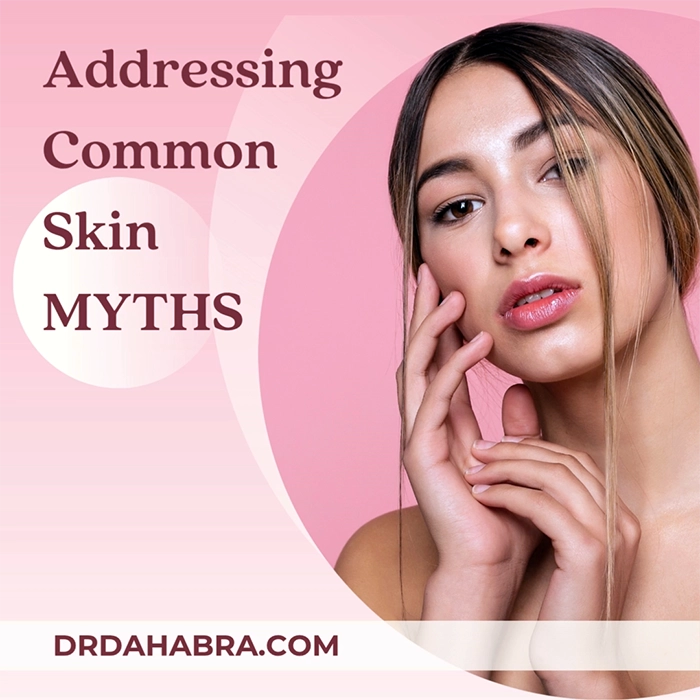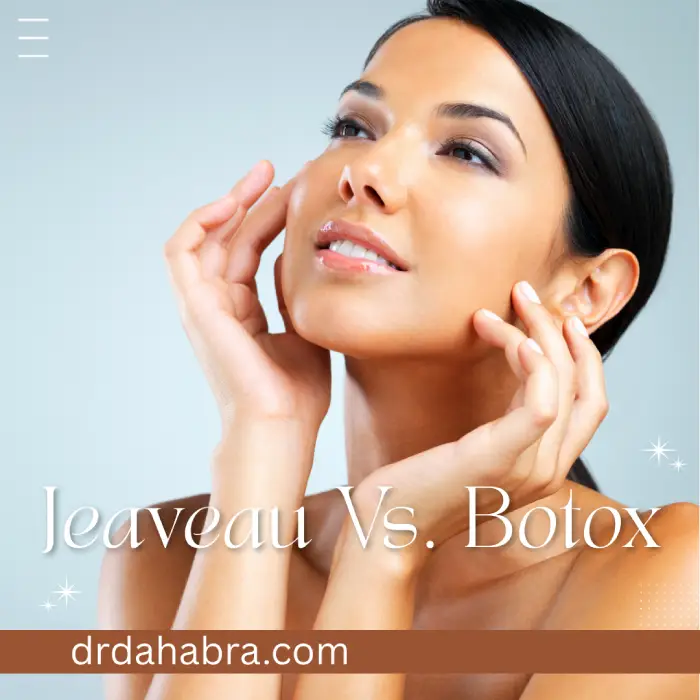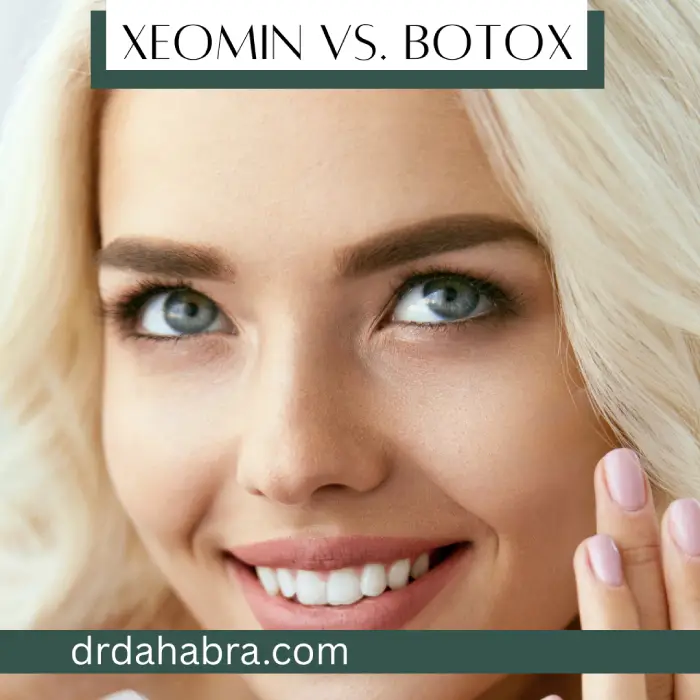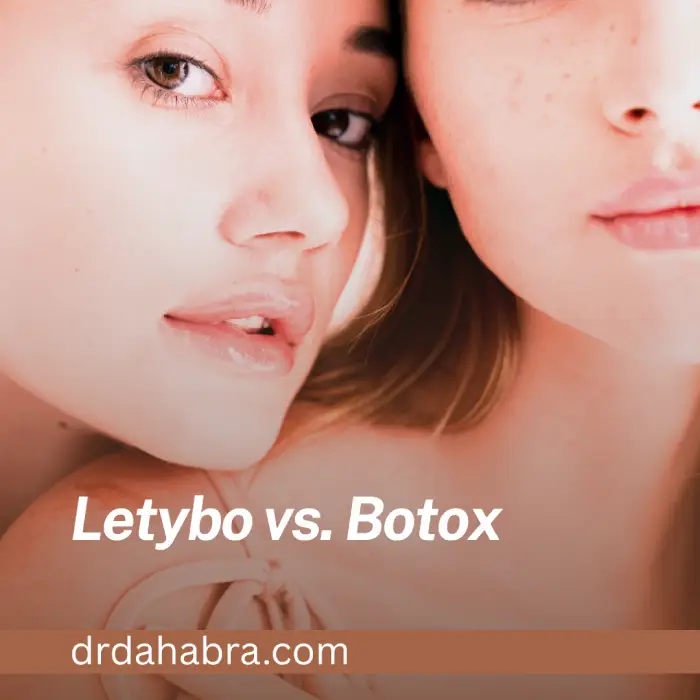Mitos comunes sobre la piel con el Dr. Dahabra: Realidad frente a ficción desmentida
¿Cuáles son los mitos más comunes sobre la piel?
Todo el mundo ha oído alguna vez consejos contradictorios sobre el cuidado de la piel, como los "mitos del cuidado natural de la piel" que son más seguros, los "mitos del cuidado de la piel de los famosos" o que los alimentos grasos deben causar acné. Este artículo aborda con el Dr. Dahabra los mitos más comunes sobre la piel, desmitificando la realidad frente a la ficción.
Estos "mitos comunes sobre la piel desmentidos" incluyen ideas como "mitos sobre la reducción de poros" o mitos sobre la protección solar desmentidos.
Pero, ¿qué es real y qué es ficción?
We tackle the top skincare misconceptions head-on, separating dermatologist skin myths from skincare facts vs fiction.
Los mitos sobre la piel siguen extendiéndose porque a menudo se simplifican demasiado, como en "Mitos y realidades sobre el acné", donde se da a entender que la dieta por sí sola controla los brotes. Si a esto le añadimos una pizca de exageración en las redes sociales, como "mitos sobre la belleza limpia" o "mitos sobre el antienvejecimiento al descubierto", los mitos se consolidan.
Desgraciadamente, el marketing y los repetidos mitos de los famosos sobre el cuidado de la piel a menudo eclipsan los consejos auténticos basados en la investigación.
Actuar basándose en información errónea, como saltarse la protección solar en casa o usar pasta de dientes en los granos, puede dañar la barrera cutánea, empeorar el acné o acelerar el proceso de envejecimiento. Creer mitos sobre la exfoliación, la hidratación o el cuidado profesional de la piel puede incluso aumentar la inflamación o provocar sequedad.
Desvelaremos estos "mitos sobre los ingredientes del cuidado de la piel" y otros más, para que pueda proteger y nutrir su piel de manera informal.
Índice
1. ¿Es realmente necesario usar protección solar todos los días, incluso en interiores?
2. ¿Las personas con tonos de piel más oscuros pueden saltarse la protección solar?
3. ¿Es mi dieta grasa la verdadera causa de mi acné?
4. ¿Reventar los granos hará que desaparezcan más rápido?
5. ¿Es cierto que sólo los adolescentes tienen acné?
6. ¿Debería lavarme más la cara para prevenir los brotes?
7. Si tengo la piel grasa, ¿debo prescindir de la crema hidratante?
8. ¿Beber más agua por sí solo puede curar mi piel seca?
9. ¿Es el cuidado de la piel "natural" u "orgánico" siempre la opción más segura?
10. ¿Se abren y cierran realmente mis poros con el agua fría y caliente?
11. ¿Pueden los ejercicios faciales prevenir realmente las arrugas?
12. ¿Es demasiado pronto a los 20 años para empezar a usar productos antienvejecimiento?
13. ¿Los productos de cuidado de la piel caros me darán mejores resultados antienvejecimiento?
14. ¿Son los tratamientos faciales profesionales una parte necesaria de una buena rutina de cuidado de la piel?
15. Preguntas más frecuentes (FAQ)
16. Conclusión
17. Referencias
1. ¿Es realmente necesario usar protección solar todos los días, incluso en interiores?
Puede parecer excesivo, pero sí, la protección solar diaria es esencial.
Aunque trabajes desde casa o esté nublado, los rayos UV siguen llegando a tu piel. Los rayos UVA, en particular, atraviesan el cristal y pueden acelerar el envejecimiento de la piel y aumentar el riesgo de cáncer. Por eso, usar FPS en interiores no es una exageración, sino una protección.
La afirmación de que "la protección solar es un mito para los días nublados" sugiere que sólo se necesita en los días soleados, pero los dermatólogos la desmienten rotundamente. La luz de la pantalla no provoca quemaduras, pero los rayos UV del ambiente a través de las ventanas sí.
Piense en el SPF diario como en lavarse los dientes, no es negociable.
Elegir el FPS adecuado también es crucial. No es necesario un FPS 100; basta con uno de amplio espectro y un FPS 30 o superior.
Y sí, tendrás que volver a aplicarte, sobre todo si estás cerca de ventanas o tienes luces que emitan UV, como las bombillas halógenas.
2. ¿Las personas con tonos de piel más oscuros pueden saltarse la protección solar?
Existe el peligroso mito de que las pieles ricas en melanina no necesitan protección solar.
Si bien es cierto que la piel oscura tiene cierta protección natural contra los rayos UV, esto no la hace inmune a los daños. El cáncer de piel, la hiperpigmentación y los primeros signos de envejecimiento siguen afectando a las personas de piel oscura.
Muchos dermatólogos trabajan activamente para desmentir esta creencia común. Los "mitos sobre el uso de protectores solares" suelen ignorar el riesgo de hiperpigmentación postinflamatoria y tono desigual de la piel, especialmente por una exposición al sol no tratada.
Sunscreen can help manage these skin concerns efectivamente.
Cada vez son más las marcas que ofrecen protectores solares que no dejan manchas blancas. Los productos diseñados para pieles ricas en melanina garantizan protección sin comprometer la apariencia y rompen el mito de que la protección solar es solo para pieles claras.
3. ¿Es mi dieta grasa la verdadera causa de mi acné?
Este es uno de los "mitos y realidades del acné" más antiguos que se han circulan desde hace décadas.
Aunque la dieta puede influir en el acné, comer alimentos grasientos como pizza o patatas fritas no es la única causa.
¿Los verdaderos culpables? Las hormonas, el exceso de sebo, las bacterias y la inflamación.
Sin embargo, algunos alimentos con altos índices glucémicos, como el pan blanco o las bebidas azucaradas, pueden disparar la insulina y contribuir a la aparición de granos. Por eso los dermatólogos afirman que una dieta equilibrada favorece una piel más clara pero no curará el acné de la noche a la mañana.
Así que no te castigues por cada tentempié. En lugar de eso, céntrate en los alimentos integrales, la hidratación y una rutina constante.
El acné es una enfermedad compleja, y culpar a la comida grasienta es un mito demasiado simplista que añade culpabilidad innecesaria.
4. ¿Reventar los granos hará que desaparezcan más rápido?
Es muy tentador, pero reventarte los granos no te ayudará.
Puede hacer que las bacterias penetren más profundamente, provocando más inflamación, cicatrices o incluso infecciones. El "mito de la pasta de dientes en los granos" o "los mitos del maquillaje y el acné" ofrecen atajos arriesgados que a menudo resultan contraproducentes.
Los dermatólogos lo tienen claro: resiste las ganas. Incluso las manos limpias pueden propagar bacterias. Además, los granos reventados pueden enquistarse o dejar decoloración o cicatrices a largo plazo.
En su lugar, aplica un tratamiento localizado con ingredientes como el ácido salicílico o el peróxido de benzoilo. Estos productos atacan la inflamación de raíz y aceleran el proceso de curación de forma segura. Deja las extracciones en manos de profesionales cualificados para evitar empeorar la situación.
5. ¿Es cierto que sólo los adolescentes tienen acné?
La creencia de que "el acné adolescente es un mito" está anticuada. El acné adulto es cada vez más frecuente, sobre todo en mujeres de 20, 30 e incluso 40 años.
Las hormonas, el estrés y los cambios en el estilo de vida pueden desencadenar brotes más adelante.
Muchos se sorprenden cuando el acné aparece después del parto, durante la perimenopausia o a causa del síndrome de ovario poliquístico. Los "mitos y realidades sobre el acné" suelen pasar por alto los factores que contribuyen a la aparición del acné en la edad adulta, considerándolos problemas específicos de los adolescentes.
Por lo tanto, si tienes problemas con los brotes después de la adolescencia, no estás solo. Necesitarás un enfoque de cuidado de la piel adaptado a la piel adulta, en lugar de productos agresivos dirigidos a adolescentes que pueden hacer más daño que bien.
6. ¿Debería lavarme más la cara para prevenir los brotes?
Un lavado excesivo puede despojar a la piel de sus aceites naturales, agravando el problema.
It’s a classic “rutina de cuidado de la piel myths” mistake: thinking squeaky-clean skin equals fewer breakouts. In reality, it disrupts the barrier and triggers more oil production.
Dos veces al día es suficiente, por la mañana y por la noche. Si sudas, haces ejercicio o llevas mucho maquillaje, añade una limpieza suave.
Algo más puede ser contraproducente, especialmente con productos agresivos.
Busca limpiadores sin sulfatos y no comedogénicos. Evita las herramientas abrasivas o los exfoliantes frecuentes, ya que pueden empeorar el acné y provocar microdesgarros.
Una limpieza suave, combinada con tratamientos específicos, es lo más eficaz para conseguir una piel clara a largo plazo.
7. Si tengo la piel grasa, ¿debo prescindir de la crema hidratante?
Esta es una de las mayores creencias sobre los "mitos de las cremas hidratantes para pieles grasas".
Si te saltas la hidratación, las glándulas sebáceas se disparan. La piel piensa que está demasiado seca y lo compensa produciendo más grasa.
What you need is a lightweight, oil-free, non-comedogenic moisturizer. Gel formulas are great for oily or acne-prone skin.
Hidratar sin obstruir los poros ayuda a equilibrar el cutis.
Así que sí, incluso las pieles grasas necesitan hidratación. Se trata de encontrar el producto adecuado, no de eliminar la hidratación.
Su barrera cutánea se lo agradecerá y es probable que deje de producir grasa en exceso con el tiempo.
8. ¿Beber más agua por sí solo puede curar mi piel seca?
La hidratación ayuda, pero no es una solución mágica.
This “skin hydration myths” idea, that drinking more water and your skin will glow, is overly simplistic. Skin health is more than hydration from the inside out.
La hidratación tópica es crucial. La piel seca carece tanto de agua como de grasa.
Por eso es fundamental aplicar humectantes (como la glicerina o el ácido hialurónico), seguidos de oclusivos (como las ceramidas). Fijan la hidratación y reconstruyen la barrera cutánea.
Drinking water supports overall health, but to treat dry skin, external hydration, and consistent skincare are essential. Combine both approaches for the best results.
9. ¿Es el cuidado de la piel "natural" u "orgánico" siempre la opción más segura?
He aquí un escenario clásico de "mitos del cuidado natural de la piel" y "mitos de la belleza limpia".
Que sea natural no significa que sea suave o seguro. La hiedra venenosa es natural, ¡pero no la querrías en tu crema hidratante!
Algunos ingredientes naturales pueden provocar alergias, irritaciones u obstruir los poros. En cambio, los ingredientes sintéticos suelen ser más estables, están más probados y son más eficaces.
Los "mitos sobre los ingredientes del cuidado de la piel" suelen equiparar lo natural con lo mejor, lo cual no siempre es cierto.
Mira más allá de la etiqueta y examina la formulación. Lo que importa es cómo actúa un ingrediente sobre la piel, no su procedencia.
La seguridad depende de su tipo de piel, del nivel de pH del producto y de su método de conservación.
10. ¿Se abren y cierran realmente mis poros con el agua fría y caliente?
Este es un clásico de los "mitos del tamaño de los poros".
Los poros no tienen músculos, por lo que no pueden abrirse ni cerrarse físicamente. El calor puede ablandar el sebo, haciendo que los poros parezcan más visibles, pero no estás "abriendo" nada.
El agua fría puede reducir temporalmente la inflamación y tensar la piel, dando la ilusión de poros más pequeños, pero no cambia su tamaño real. No se pueden reducir los poros de forma permanente, a pesar de lo que afirman los mitos de la reducción de poros.
La forma más eficaz de controlar la apariencia de los poros es exfoliarlos correctamente, utilizar ácidos como el salicílico y mantener la piel limpia e hidratada. Piensa menos en abrir y más en limpiar.
11. ¿Pueden los ejercicios faciales prevenir realmente las arrugas?
Este la tendencia "mitos antienvejecimiento al descubierto" sugiere que se puede levantar la cara como los bíceps. Aunque el yoga facial mejora la circulación, las expresiones exageradas pueden profundizar las líneas dinámicas con el tiempo.
Los movimientos repetidos, como fruncir el ceño o entrecerrar los ojos, pueden provocar la formación de líneas de expresión. Los ejercicios faciales pueden ayudar a desarrollar un tono muscular menor, pero no borrarán las arrugas.
En todo caso, podrían empeorar las patas de gallo o las líneas de expresión.
¿Cuáles son las estrategias fundamentales para prevenir las arrugas?
Protección solar, retinoides, hidratación y evitar movimientos repetitivos.
No te fíes de las flexiones faciales; apuesta por un cuidado de la piel basado en pruebas.
12. ¿Es demasiado pronto a los 20 años para empezar a usar productos antienvejecimiento?
En absoluto. Empezar pronto con cuidados suaves y preventivos ayuda.
Piensa en los 20 años como un periodo de "modo mantenimiento". Los "mitos antienvejecimiento del cuidado de la piel" suelen aconsejar esperar a que aparezcan las arrugas, pero para entonces el daño ya está hecho.
Los antioxidantes ligeros, como la vitamina C, el SPF diario y los retinoides ocasionales, protegen y retrasan los signos del envejecimiento; no hay necesidad de tratamientos agresivos, sólo de forma constante y una atención esmerada.
Adquirir hábitos a una edad temprana da sus frutos más adelante. El envejecimiento de la piel empieza antes de que lo veas, por lo que un cuidado proactivo a los 20 años es inteligente, no excesivo.
13. ¿Los productos de cuidado de la piel caros me darán mejores resultados antienvejecimiento?
No caigas en los "mitos del cuidado caro de la piel". Precio no siempre equivale a rendimiento.
Algunas marcas de lujo gastan más en el envase que en los ingredientes. El retinol de farmacia puede ser más eficaz que una crema "milagrosa" de lujo.
Lo que importa es la formulación, no el coste. Busque ingredientes de eficacia probada, como péptidos, niacinamida y retinoides, en lugar de anuncios llamativos o el respaldo de famosos.
Los "mitos del cuidado profesional de la piel" suelen girar en torno al esnobismo de marca.
Dicho esto, algunos productos de gama alta pueden contener ingredientes refinados o mejores sistemas de administración. Pero lea siempre la etiqueta, no sólo el precio.
14. ¿Son los tratamientos faciales profesionales una parte necesaria de una buena rutina de cuidado de la piel?
Professional tratamientos faciales can be helpful, but they’re not mandatory.
Este es uno de esos "mitos del cuidado profesional de la piel" que a menudo difunden los salones de belleza. Para la mayoría de la gente, una buena rutina en casa hace el trabajo pesado.
Los tratamientos faciales pueden ser beneficiosos para problemas específicos, como la congestión o la deshidratación, pero sus efectos suelen ser a corto plazo. No pueden sustituir al cuidado constante de la piel, la protección solar o el tratamiento dermatológico cuando sea necesario.
Piense en los tratamientos faciales como un refuerzo ocasional, no como algo esencial. Si te gusta el ritual, hazlo.
Sin embargo no te sientas presionado a derrochar a menos que realmente lo disfrutes o tengas objetivos específicos de cuidado de la piel.
15. Preguntas frecuentes sobre los mitos más comunes sobre la piel con el Dr. Dahabra: Realidad frente a ficción desmentida
Q1. ¿Es cierto que no hace falta protección solar los días nublados?
Respuesta concisa: Falso; los rayos UV siguen atravesando las nubes y pueden dañar la piel.
Respuesta detallada: Incluso en días nublados o cubiertos, la piel puede recibir hasta 80% de rayos UVA y UVB nocivos. Con el tiempo, estos rayos contribuyen al envejecimiento prematuro, la aparición de manchas solares y un mayor riesgo de cáncer de piel.
Saltarse la protección solar porque está nublado es uno de los principales mitos sobre protección solar desmentidos por los dermatólogos. Para proteger la piel durante todo el año, aplícate FPS a diario, independientemente del tiempo que haga.
Q2. ¿Los alimentos grasos causan realmente acné?
Respuesta concisa: La dieta puede afectar indirectamente al acné, pero la comida grasienta no es la causa principal.
Respuesta detallada: Este es uno de los mitos y realidades más antiguos sobre el acné. Aunque es posible que los alimentos grasos no causen directamente los brotes, pueden formar parte de un panorama más amplio en el que intervienen las hormonas, el consumo de azúcar y la inflamación.
Los estudios sugieren que los alimentos con alto índice glucémico (como los aperitivos azucarados o el pan blanco) pueden empeorar el acné. Aun así, tu piel no reaccionará de repente solo a las patatas fritas o a la pizza; una dieta sana y equilibrada y un cuidado de la piel constante son más importantes que eliminar todas las comidas "grasientas".
Q3. ¿Puede la pasta de dientes eliminar los granos de la noche a la mañana?
Respuesta concisa: El uso de pasta de dientes puede irritar y dañar la piel.
Respuesta detallada: Aplicar pasta de dientes a los granos es un mito persistente sobre el cuidado de la piel, pero en esencia se trata de un concepto erróneo. La mayoría de los dentífricos contienen ingredientes como el mentol o el bicarbonato de sodio, que pueden secar temporalmente un grano, pero también pueden provocar irritación, enrojecimiento o quemaduras químicas.
En su lugar, utiliza tratamientos puntuales con ácido salicílico o peróxido de benzoilo, ingredientes de eficacia probada diseñados para la piel.
Q4. ¿Le sientan mejor a su piel los productos naturales o ecológicos?
Respuesta concisa: No necesariamente; natural no siempre significa más seguro o más eficaz.
Respuesta detallada: Los "mitos del cuidado natural de la piel" suelen presentar los ingredientes sintéticos como perjudiciales, pero muchos compuestos naturales también pueden irritar o incluso dañar la piel sensible. Por otro lado, los ingredientes desarrollados en laboratorio suelen ser más estables, eficaces y han sido sometidos a pruebas exhaustivas.
Lo que importa es la formulación, la concentración y la compatibilidad con su piel, no si procede de una planta o de un laboratorio.
Q5. ¿La piel grasa significa que no se debe usar crema hidratante?
Respuesta concisa: No, incluso las pieles grasas necesitan hidratación.
Respuesta detallada: Saltarse la crema hidratante puede tener consecuencias imprevistas. Cuando la piel grasa está deshidratada, suele producir aún más grasa para compensar su falta de hidratación.
La clave es utilizar una crema hidratante ligera, sin aceites y no comedogénica. Esto ayuda a mantener la barrera cutánea y equilibra la producción de grasa.
Así que, olvídate de los mitos sobre las cremas hidratantes y la piel grasa; la hidratación es esencial para todo tipo de piel.
Q6. ¿Puedo reducir mis poros con productos para el cuidado de la piel?
Respuesta concisa: No, el tamaño de los poros es principalmente genético y no puede modificarse de forma permanente.
Respuesta detallada: Los mitos sobre la reducción de poros están por todas partes, pero ésta es la verdad: aunque en realidad no se pueden "reducir" los poros, sí se puede disminuir su apariencia. Exfoliarse con BHA (ácido salicílico), mantener los poros limpios y usar retinoides puede ayudar a minimizar la visibilidad de estas imperfecciones.
Pero los productos no pueden cerrarlas, encogerlas o borrarlas; son una parte estructural de tu piel.
Q7. ¿El retinol diluye la piel con el tiempo?
Respuesta concisa: No, en realidad el retinol engrosa las capas más profundas de la piel con su uso constante.
Respuesta detallada: Un mito muy extendido en el cuidado de la piel contra el envejecimiento es que el retinol adelgaza la piel. Al principio puede provocar sequedad o descamación, pero su uso prolongado ayuda a estimular el colágeno, fortalece la dermis y mejora la textura.
Es uno de los ingredientes más investigados y eficaces contra el envejecimiento y el acné. Con el uso y la hidratación adecuados, es un potente fortalecedor de la piel, no una amenaza para el adelgazamiento.
Q8. ¿Es perjudicial exfoliarse todos los días?
Respuesta concisa: Sí, la exfoliación diaria puede dañar la barrera cutánea.
Respuesta detallada: Los mitos sobre la exfoliación suelen empujar a frotar a diario, pero la piel no necesita tanto. El exceso de exfoliación provoca rojeces, sensibilidad y una barrera cutánea debilitada.
La mayoría de las pieles sólo necesitan exfoliarse dos o tres veces por semana. Elige exfoliantes químicos suaves, como los AHA o los BHA, y evita los exfoliantes físicos fuertes, sobre todo si tienes acné activo.
Q9. ¿Se puede llegar a ser "inmune" a los productos para el cuidado de la piel?
Respuesta concisa: No, la piel no crea inmunidad, pero las necesidades pueden cambiar con el tiempo.
Respuesta detallada: Uno de los mitos recurrentes de las rutinas de cuidado de la piel es que los productos dejan de funcionar porque la piel se acostumbra a ellos. En realidad, el estado de tu piel o tu entorno (estaciones, hormonas, estrés) pueden cambiar y hacer que sientas que un producto "ha dejado de funcionar".
Rotar con demasiada frecuencia puede irritar la piel. Si un producto sigue satisfaciendo sus necesidades, no es necesario sustituirlo innecesariamente.
Q10. ¿Necesitan los hombres y las mujeres productos diferentes para el cuidado de la piel?
Respuesta concisa: En realidad no; las necesidades de la piel dependen más del tipo y las preocupaciones que del sexo.
Respuesta detallada: Los mitos sobre el cuidado de la piel masculina suelen sugerir que los hombres necesitan fórmulas especiales, pero se trata sobre todo de marketing. Sí, la piel masculina puede ser más gruesa y grasa por término medio debido a los efectos de la testosterona, pero el cuidado eficaz de la piel debe adaptarse a las preocupaciones individuales, más que al sexo.
Todo el mundo necesita limpieza, hidratación y protección solar, independientemente de la marca.
Q11. ¿Puede el maquillaje provocar acné u "obstruir" los poros?
Respuesta concisa: Sólo si no es no comedogénico o no se elimina correctamente.
Respuesta detallada: Los mitos sobre el maquillaje y el acné culpan de los brotes exclusivamente a los cosméticos. Sin embargo, la mayoría de las bases modernas están formuladas para ser no comedogénicas, lo que significa que no obstruyen los poros.
El verdadero problema no es borrar el maquillaje ni utilizar herramientas sucias. La doble limpieza nocturna y el uso de productos no comedogénicos te ayudarán a mantener la piel limpia.
Q12. ¿Absorbe tu piel vitamina D si usas protección solar?
Respuesta concisa: Sí, la protección solar no bloquea toda la absorción de vitamina D.
Respuesta detallada: El "mito de la protección solar contra la vitamina D" afirma que el uso de FPS impide la producción de vitamina D, pero los estudios demuestran que la mayoría de las personas sintetizan suficiente vitamina D con protección solar. Para obtener vitamina D basta con una breve exposición al sol en brazos o piernas.
Además, los suplementos y una dieta equilibrada son formas más seguras de mantener unos niveles adecuados sin arriesgarse a sufrir daños por los rayos UV.
Q13. ¿Funcionan realmente las cremas antiedad?
Respuesta concisa: Sí, pero sólo aquellos con principios activos probados.
Respuesta detallada: Los "mitos antienvejecimiento al descubierto" suelen afirmar que las cremas no sirven para nada, pero ingredientes como el retinol, los péptidos y los antioxidantes tienen un sólido respaldo científico. No borrarán las arrugas de la noche a la mañana, pero pueden suavizar las líneas de expresión, mejorar la elasticidad e igualar el tono.
El truco está en el uso constante a lo largo del tiempo, no en esperar un milagro en una semana.
Q14. ¿Es seguro dormir maquillado de vez en cuando?
Respuesta concisa: No es recomendable, ya que puede obstruir los poros y acelerar el envejecimiento de la piel.
Respuesta detallada: Dormir con maquillaje atrapa la suciedad, la grasa y la contaminación de la piel. Puede obstruir los poros, desencadenar brotes e incluso provocar infecciones oculares si la máscara de pestañas o el eyeliner se transfieren a los ojos.
A largo plazo, puede contribuir a la falta de luminosidad y al envejecimiento prematuro. Aunque solo sea una vez, intenta limpiarte la piel antes de acostarte para lucir una piel más sana.
Q15. Can drinking water alone give you ¿una piel radiante?
Respuesta concisa: No, pero favorece la salud general de la piel cuando se combina con cuidados tópicos.
Respuesta detallada: Los mitos sobre la hidratación y la piel exageran el agua como remedio milagroso para la piel apagada. Mantenerse hidratado es esencial, pero si tu piel es seca o escamosa, también necesitas hidratación tópica.
Ingredientes como el ácido hialurónico y las ceramidas ayudan a retener el agua en la piel. Así que sí, bebe agua, pero también hidrátala de forma constante para obtener verdaderos resultados de "piel de cristal".
16. Conclusión: Mitos comunes sobre la piel con el Dr. Dahabra: Realidad frente a ficción desmentida
En un mundo en el que la desinformación se difunde más rápido que los hechos, especialmente en el sector de la belleza, distinguir entre realidad y ficción en el cuidado de la piel nunca ha sido tan importante.
The skin myths we’ve debunked, from sunscreen misconceptions to pore size myths, are not just harmless tales; they can be detrimental to your health. They’re habits could be quietly damaging your skin, wasting your time, and draining your wallet.
Es hora de dejar de dejar que las redes sociales o los mitos de los famosos dicten tu rutina de cuidado de la piel.
Imagina despertarte con una piel sana, no porque te hayas gastado cientos de euros en el último suero de moda, sino porque sabes lo que tu piel necesita de verdad. Se acabaron los mitos sobre la reducción de poros, los mitos sobre el cuidado natural de la piel o el manido consejo de que la pasta de dientes cura los granos.
En su lugar, elige con confianza productos basados en pruebas, no en emociones.
Eso es poderoso.
Eso es liberador.
En eso consiste el cuidado innovador de la piel.
Te mereces algo más que trucos de marketing de belleza. Te mereces la verdad.
Y una vez que aprendes a confiar en los dermatólogos por encima de los influencers, a cuestionar los mitos sobre el uso de protectores solares y la exfoliación, desbloqueas el verdadero potencial de tu piel.
El camino hacia una piel resplandeciente y resistente no empieza en la cesta de la compra, sino en la mentalidad.
Sea curioso.
Sé escéptico.
Y siempre, siempre, elija los hechos por encima de la ficción.
We have covered everything about addressing common skin myths with Dr. Dahabra, debunking fact vs. fiction.
Mitos comunes sobre la piel con el Dr. Dahabra: Realidad frente a ficción desmentida
Mitos sobre la piel con el Dr. Dahabra: realidad y ficción desmentidas. ¿Por qué esperar para liberar tu belleza?
Llámenos ahora al (954) 595-2607 o reserve online. Su viaje comienza con sólo un clic o una llamada.
Abraza la belleza, abraza la innovación - Embrace You.
17. Referencias
Beverly Hills Wellness Center & Med Spa, Florida
Análisis de la asociación entre el uso de protectores solares y el riesgo de melanoma maligno
Institutos Nacionales de Salud (PMC)
Este metaanálisis revisó múltiples estudios epidemiológicos y concluyó que no hay pruebas de que la protección solar aumente el riesgo de melanoma, sino que la culpable es la exposición a los rayos UV.
Efectos de la dieta en el acné y su respuesta al tratamiento
PMC, NIH
Esta investigación destaca cómo las dietas de bajo índice glucémico reducen las lesiones de acné en comparación con las dietas de alto índice glucémico, lo que refuerza tanto los conceptos erróneos más comunes como los hechos sobre la relación entre la dieta y el acné.
Dieta y acné: Una revisión sistemática
PMC, NIH
A comprehensive review reveals that high glycemic load and carbohydrate intake have a modest but significant effect on acne production, debunking common diet myths about foods high in grasa.
Una dieta de baja carga glucémica mejora los síntomas en pacientes con acné vulgar
ScienceDirect
Pruebas de ensayos clínicos que demuestran que una dieta con baja carga glucémica mejora el acné y la sensibilidad a la insulina, ofreciendo una base objetiva más allá de los mitos simplistas de la comida grasienta.
Asociación entre acné adulto y conductas alimentarias: resultados de la cohorte Nutrinet-Santé
JAMA Dermatology vía SpringerLink
Estudio prospectivo de cohortes que relaciona el acné adulto con el consumo de leche, bebidas azucaradas y productos grasos, confirmando las correlaciones entre acné y dieta.
Impacto de la dieta y la nutrición en pacientes con acné vulgar
MDPI Nutrientes
Revisión del papel de la dieta en la patogénesis del acné, haciendo hincapié en la inflamación provocada por los patrones dietéticos occidentales y desmontando los mitos de la simplificación excesiva de la dieta.
Una revisión de la protección solar en la prevención del cáncer de piel
Revistas Sage
Pruebas recientes sugieren que la protección solar reduce significativamente la incidencia del melanoma y del cáncer de piel no melanoma, lo que refuerza la importancia del uso diario de FPS.
Percepciones de los pacientes sobre el acné, la nutrición y la falta de información dietética
Fronteras de la comunicación
Una encuesta revela las creencias de los pacientes sobre la relación entre el acné y la dieta, lo que pone de manifiesto la falta de un asesoramiento nutricional preciso por parte de los dermatólogos.
Dieta y acné: retos de la traducción de datos epidemiológicos nutricionales
JAMA Dermatología
Una mirada en profundidad a las complejidades y limitaciones de la investigación sobre el acné alimentario, advirtiendo contra las conclusiones simplistas.
77% de todos los productos de protección solar no cumplen las normas
Real Simple (cita investigaciones medioambientales y dermatológicas)
Este estudio critica la eficacia de los protectores solares y su uso público, aclarando conceptos erróneos y haciendo hincapié en la correcta aplicación de los productos con SPF 30+ de amplio espectro.




